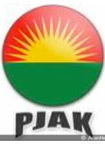Concern Over War in Kurdistan
» IRGC Shells Border in Response to PJAK
Officials of the Islamic republic of Iran announced that four clashes had taken place with Kurds in the Kurdish border areas resulting in the death of 11 individuals on both sides.
Other news reports indicated that the intense shelling there had caused the residents of some of the Ghandil mountain villages in Iraqi Kurdistan to leave the area as the clashes between the IRGC and the Kurdish PJAK (The Party for Free Life in Kurdistan) armed group continued.
According to government announcements, IRGC’s shelling took place in response to PJAK’s attack on the border posts in November of last year when 4 policemen were killed. But Kurdish activists yesterday criticized the actions of PJAK and the violent policies of the Islamic republic in Kurdistan and said these actions strove to turn the area into a security zone, laying the groundwork for an armed war.
Contradictory Statements by the Islamic Republic
General Mohammad Pakpour on Monday told Fars news agency, affiliated with the security-military apparatus of Iran that the IRGC (Islamic Revolution Guards Corps) were striving to bring “permanent security to the region” adding that two members of PJAK were killed in this recent round of clashes.
This commander of the IRGC ground forces said, “Following the terrorist acts of this terrorist group affiliated with global arrogance (a term the Islamic republic uses for the West and particularly the US) on March 24 in the town of Sanandaj which resulted in injuries to two commanders, the Hamzeh Seyed al-Shohada force of the IRGC identified the principal sources of this crime and killed the perpetrators through a siege.”
But just a few hours following this statement, the Iranian Border Guard Commander Brigadier General Hossein Zolfaghari announced that, “Four 4 personnel of the police were killed and three others wounded while four terrorist were killed or wounded in the clashes” between the government forces and the rebel Kurds.
Zolfaghari said that of the four operations, three were against the PJAK, adding, “in two of these clashes because of the timely response of the border guards PJAK terrorist group members failed to reach the border posts, and dispersed.”
He also spoke of “Clashes between smugglers and the border force for a full hour forcing the smugglers to leave the area leaving 187 weapons behind,” without providing more details on who the smugglers were.
PJAK has till this moment not responded to these news reports and it appears that these clashes took place in the town of Marivan which resulted in four deaths and two wounded. These latest round of clashes took place on April 2nd as a border post was attacked by armed men.
Residents Flee
According to local Kurdish media, these military measures by the Islamic republic against PJAK involved artillery shelling of the Kurdish border areas and their residents.
Rodad website wrote that because of aerial bombardments of the border areas near Balakaiti region, the residents were forced to leave their homes and villages. According to this site, these attacks by the Islamic republic were made after a lull of about a year of inactivity in the region, while other sources indicated that the armed forces of the Islamic republic had engaged in similar attacks against Kurdish areas about six months ago as well.
According to Kurdish Perspective website which covers Kurdish events in the region, the areas around the Ghandil mountains were under heavy government shelling from 6:30am local time on Monday.
The villages of Varti, AbuBakreh, Ghale Toovkan, Ragz and the mountains around Ghandil were the targets of the shelling. These regions are in Iraqi Kurdistan where PJAK is said to be militarily present.
Iraqi Kurdish authorities have repeatedly said that the Islamic republic has on many occasions trespassed into Iraqi territory to crush its opponents, disrupting the security of the border residents.
PJAK regularly has armed clashes with forces from the Islamic republic. Its stated goal is to be “The defense of the rights of Iranian Kurds within a democratic regime in the country.” The Islamic republic designated this group that was formed in 2003 to be a terrorist organization.
The spokesperson for the Kurdish Human Rights Organization, Ajlal Ghavami, told Rooz that “in view of the experience that Kurdish groups had in the sixties, when they changed their struggle from an armed one to a political one, PJAK too should have followed suit. Unfortunately we continue to witness them primarily talking about an armed struggle, while such activities bring no results for the region and only help militarize it.”
Following this recent round of violence, many journalists, and civil, political and human rights activists have launched a conversation on social networks about the armed struggle embraced by some Kurdish groups and the destructive nature of such attacks.


